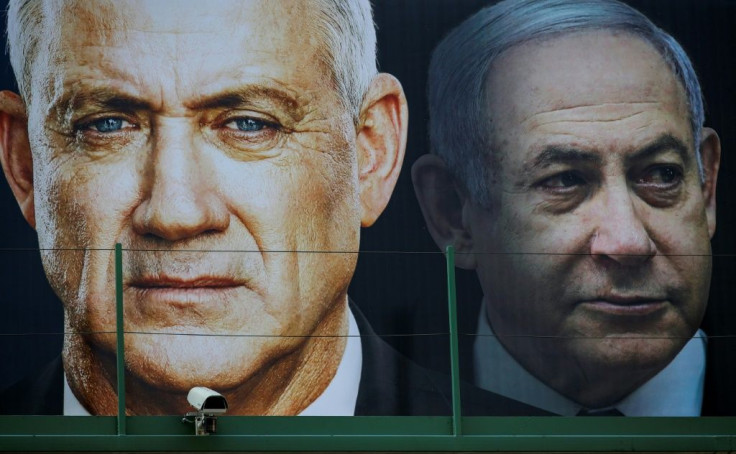Israel's Netanyahu, Gantz Agree To Form Unity Government

Israeli Prime Minister Benjamin Netanyahu reached a historic deal Monday with one-time rival parliament speaker Benny Gantz to form a unity government, ending the country's worst-ever political crisis.
The three-year agreement allows Netanyahu, 70, to stay in office for 18 months, during which he is due to stand trial on corruption charges he has long denied.
Gantz, 60, will then take over as premier for the remaining 18 months as Netanyahu bows out after 12 years in office -- the longest premiership in Israeli history.
Netanyahu, head of the right-wing Likud party, had squared off against Gantz in three inconclusive elections over the past year, but neither had secured enough support to form a viable governing coalition.
As the COVID-19 epidemic intensified following the last election on March 2, calls mounted for them to unite and offer the country a rare period of political calm as it battles an unprecedented health crisis.
"I promised the State of Israel a national emergency government that will act to save the lives and livelihoods of Israeli citizens," Netanyahu tweeted shortly after the deal was announced.
Gantz stressed that the deal had prevented "a fourth election."
Through the first six months, the government will be defined as an "emergency" body focused primarily on containing COVID-19 and mitigating the economic devastation it has caused.
Israel has more than 13,500 confirmed virus cases, including more than 170 deaths, and a nationwide lockdown has left huge numbers of people without income.
The deal evenly splits cabinet posts between Likud and Gantz's centrist Blue and White alliance.
Gantz, a former army chief, will officially become "prime minister-designate" when the government is sworn in, stepping down as parliament speaker.
Under the deal signed by members of both men's alliances, the speaker's position will then be filled by a Netanyahu loyalist.
A key issue in the unity talks was implementation of US President Donald Trump's controversial Middle East peace plan, which gives Israel the green light to annex Jewish Settlements and other territory in the occupied West Bank.

Such annexations would defy international law, and the Trump deal has been rejected by the Palestinians and condemned by much of the international community.
The Netanyahu-Gantz deal allows the prime minister "to bring President Trump's statement with regard to the realisation of Israeli sovereignty (in parts of the West Bank) to government and Parliament, following due process."
Palestinian prime minister Mohammad Shtayyeh on Monday condemned the formation of an "Israeli annexation government," saying it marked the end of the two-state solution.
Following the March election, Israeli President Reuven Rivlin mandated Gantz to form a government.
But for a third time, he was unable to forge a coalition because of deep divisions within the anti-Netanyahu bloc.
After Gantz's surprise election as speaker, he pledged to seek a deal with Netanyahu, saying the coronavirus pandemic and grinding political deadlock demanded tough compromises.
That decision led to high-profile defections from Blue and White.
Many had speculated that Netanyahu would capitalise on Gantz's weakened position to take Israel to a fourth election in 18 months.
But Monday's deal averted such a poll.
The prime minister was indicted on charges of bribery, fraud and breach of trust in January and some experts had predicted he would seek to win a parliamentary majority to push through legislation protecting him from prosecution.
A major hold-up in the unity talks was over the appointment of senior justice officials, notably those who will oversee Netanyahu's trial.
Under the deal, Gantz's bloc will select the justice minister.
But Netanyahu has reportedly retained veto power over nominees for attorney general and the public prosecutor, two posts crucial to the outcome of his trial, which starts on May 24.
© Copyright AFP 2024. All rights reserved.



















